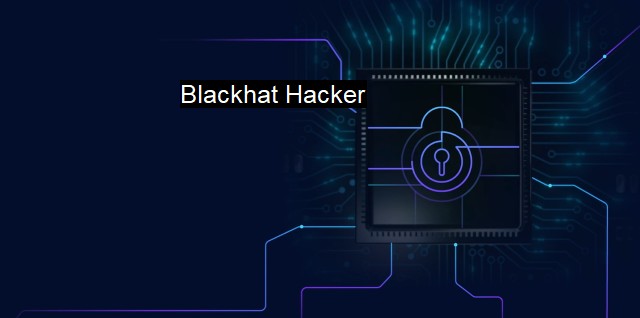What is Blackhat Hacker?
Exploring the World of Blackhat Hackers: Malicious Exploits and Cyber Warfare
A Blackhat hacker refers to a person who compromises the security or invades a system, network, or service without permission. These individuals typically have malevolent intentions, involving personal profit, revenge, or thrill-seeking. These cybercriminals may deal with stealing, blackmailing, manipulating data, or vandalizing digital resources within their reach. It is through these exploits that the Blackhat hacker gets their name, symbolizing their malfeasance and nefarious objectives versus the beneficial objectives of ethical hackers (Whitehat hackers).Blackhat hackers are considered the primary culprits behind cybercrime activities, hacking software and carrying out illegal activities, thus giving hackers an uncanny public image. Historically, the term was coined from old Western movies where the villain typically wore a black cowboy hat. The advent of cyberspace allowed these criminals to expand their activities, profiting from the advancement in information technologies and exploiting the average users' lack of technical knowledge and poor security habits.
The scope and risks of Blackhat hackers have expanded dramatically alongside technological advancements. These expert cybercriminals exploit vulnerabilities not only in computer systems but they also attack networks, mobile devices, and Internet of Things (IoT) devices. They intrude corporations, governments, and even individuals to steal data, corrupt systems, initiate widespread attacks, or even destabilize economies—making them a formidable force in the digital realm.
Globally, cybersecurity is a real and pressing issue due to blackhat hackers. They utilize various methods for disturbances such as malware, DDoS attacks, and viruses. They also engage in activities like identity theft, credit card frauds to phishing and social engineering attacks. The sophistication of these techniques has escalated in line with the intricate nature of our digital systems.
Antivirus software has a significant role in the domain of cybersecurity to combat the adverse endeavors of blackhat hackers. Primarily, antivirus software aims to detect, neutralize or eliminate malware from a digital device, preventing harmful intrusions. This software relies on a database that recognizes patterns of data—called signatures—that match known malware. Blackhat cybercriminals continually evolve their strategies to avoid detection, resulting in a dynamic and growing database.
A critical measure to combat Blackhat hackers is updating antivirus software frequently. Antivirus developers need to update their malware database continually and implement improvements to outsmart such hackers. These updates are crucial to defend against newly discovered malware – termed Zero-Day Threats – that blackhat hackers could exploit before developers have made necessary updates.
Despite the increasing skills and tactics of Blackhat hackers, cybersecurity experts and developers do not remain passive. They employ protective measures like firewalls and intrusion detection systems while reevaluating security protocols and policies to ensure robust security. ethical or Whitehat hackers help strengthen cybersecurity: they use their hacking skills to find and fix vulnerabilities before Blackhat hackers can exploit them.
Educating users about the nature of blackhat hackers is also vital. Phishing scams and similar attempts often rely on exploiting the user, rather than the system. Thus, knowing how to identify and avoid these threats becomes a personal responsibility.
Blackhat hackers are a serious cybersecurity threat. Organizations and individuals can fight back by adopting strong defensive strategies and staying informed about potential hazards. Use of firewall, antivirus software, and a general understanding of cybersecurity basics are crucial in maintaining a secure digital environment. each progress in battling blackhat hackers mirrors an equally impressive adaptability on their part, reaffirming the continuous and evolving battle in the world of cybersecurity.

Blackhat Hacker FAQs
What is a blackhat hacker?
A blackhat hacker refers to a person who uses their technical skills and knowledge to gain unauthorized access to computer systems and networks for malicious purposes. They typically exploit vulnerabilities in software or hardware to steal confidential information or cause damage to systems.What are the common motives of blackhat hackers?
The motives of blackhat hackers can range from financial gain to political activism, personal vendettas, or simply causing destruction. They may steal and sell sensitive data, compromise websites and networks for ransom, or launch distributed denial-of-service (DDoS) attacks to take down websites.How can individuals and businesses protect themselves from blackhat hackers?
Individuals and businesses can protect themselves from blackhat hackers by implementing strong cybersecurity measures such as regularly updating software, using complex passwords, enabling two-factor authentication, and investing in antivirus software. It's also essential to educate employees on safe online practices and to regularly back up important files to avoid data loss in case of a successful cyber attack.What are the legal consequences of being a blackhat hacker?
Engaging in blackhat hacking is illegal and carries severe legal consequences, such as fines, imprisonment, and forfeiture of assets. In addition to criminal charges, a convicted blackhat hacker may face civil lawsuits from individuals or companies whose data they compromised or systems they damaged. It's important to note that even attempting to hack into a computer system or network can result in criminal charges.| | A | | | B | | | C | | | D | | | E | | | F | | | G | | | H | | | I | | | J | | | K | | | L | | | M | |
| | N | | | O | | | P | | | Q | | | R | | | S | | | T | | | U | | | V | | | W | | | X | | | Y | | | Z | |
| | 1 | | | 2 | | | 3 | | | 4 | | | 7 | | | 8 | | |||||||